Abstract
One hundred consecutive patients underwent intrathoracic muscle transposition between May 1977 and February 1988. Seventy-three procedures were performed to manage the complications of infection, which included treatment of bronchopleural fistula, postpneumonectomy empyema, perforations of the heart or great vessels, and fistulae of the esophagus and trachea. Prophylactic reinforcement of the repaired viscus was done in the remaining 27 patients because of either increased airway tension or previous intrathoracic radiation. There were 71 male and 29 female patients. Ages ranged from 16 to 82 years (median, 58 years). One hundred thirty muscle transpositions were performed and included 60 serratus anterior flaps, 33 latissimus dorsi, 28 pectoralis major, 3 intercostal, 2 rectus abdominus, and 4 others. The number of operations per patient ranged from 1 to 13 (median, 2). Seventy-six complications occurred in 35 patients. There were 16 operative deaths. Follow-up ranged from 3.4 to 150.7 months (median, 41 months). Infection was controlled or avoided in 73 patients. Forty-three of the operative survivors died. Cause of death was cancer in 27 patients, cardiac in 4, pulmonary in 3, infection in 3, suicide in 1, and unknown in 5. We conclude that although associated with a significant morbidity and mortality, intrathoracic muscle transposition when there is an actual or potential leak of an intrathoracic viscus can be life saving. Long-term survival, however, is determined by the pre-existing thoracic disorder.
Full text
PDF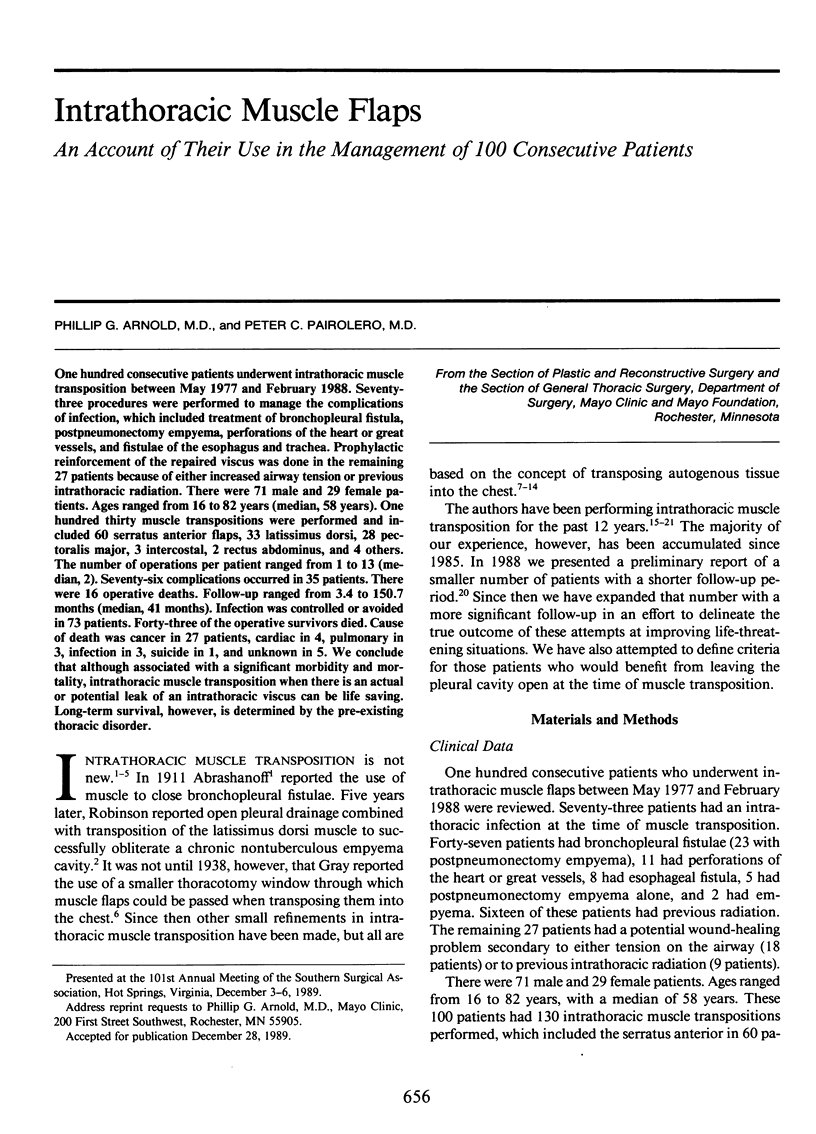
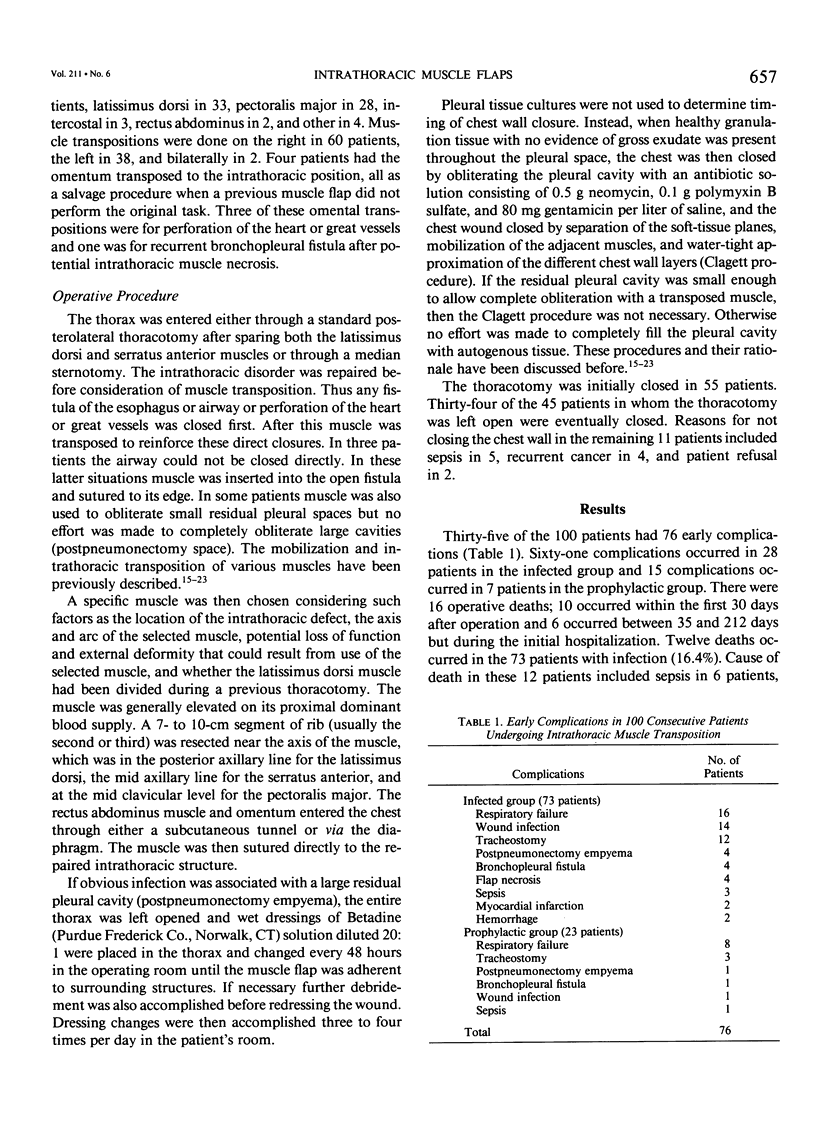
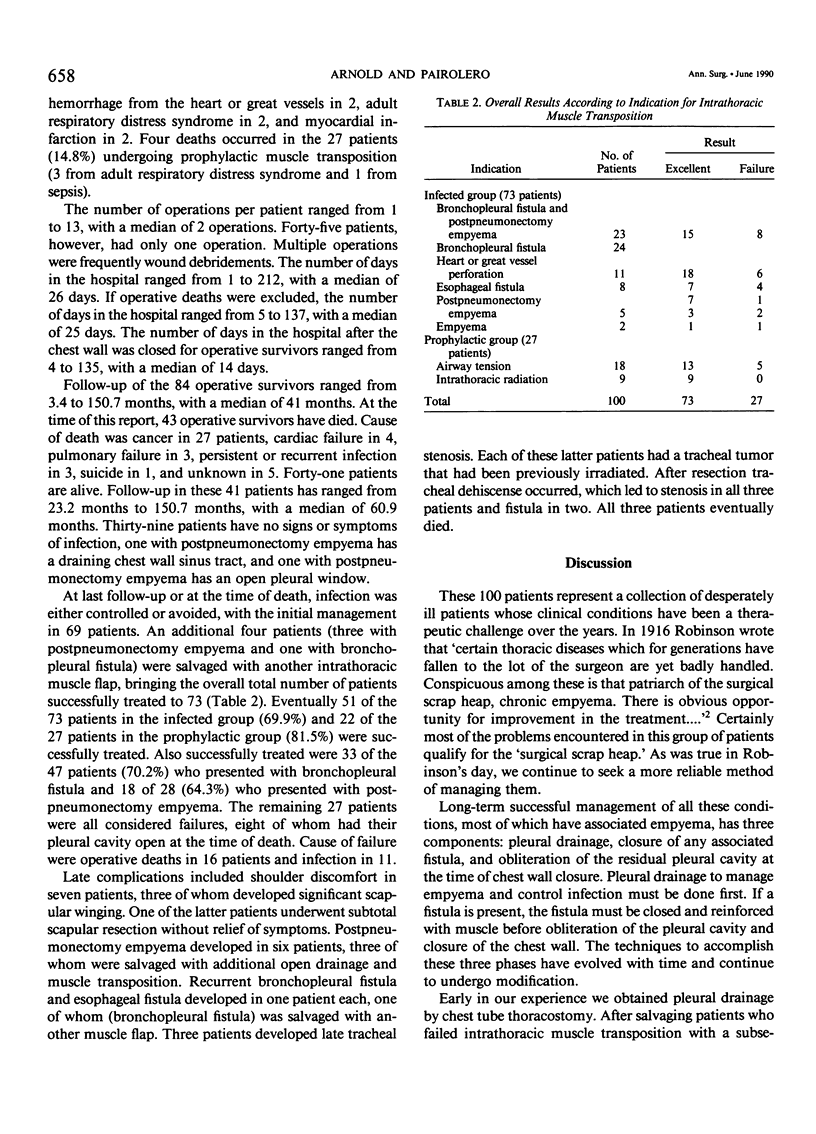
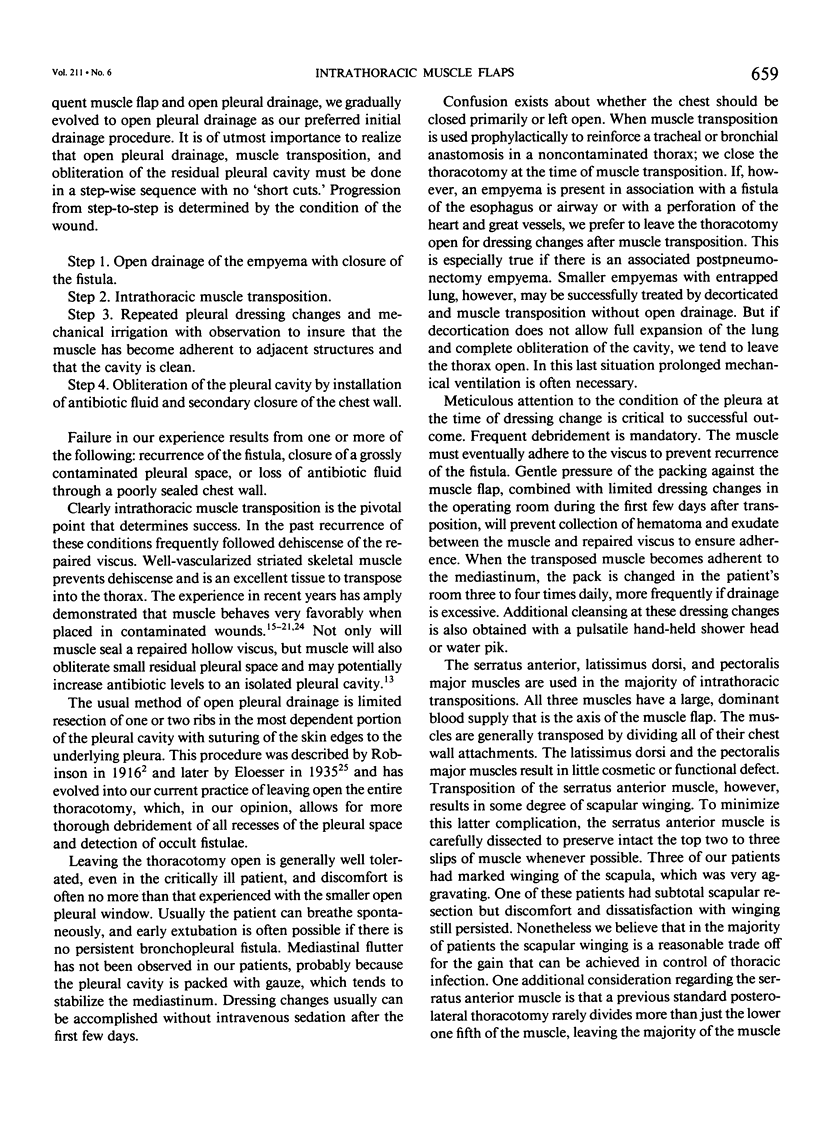
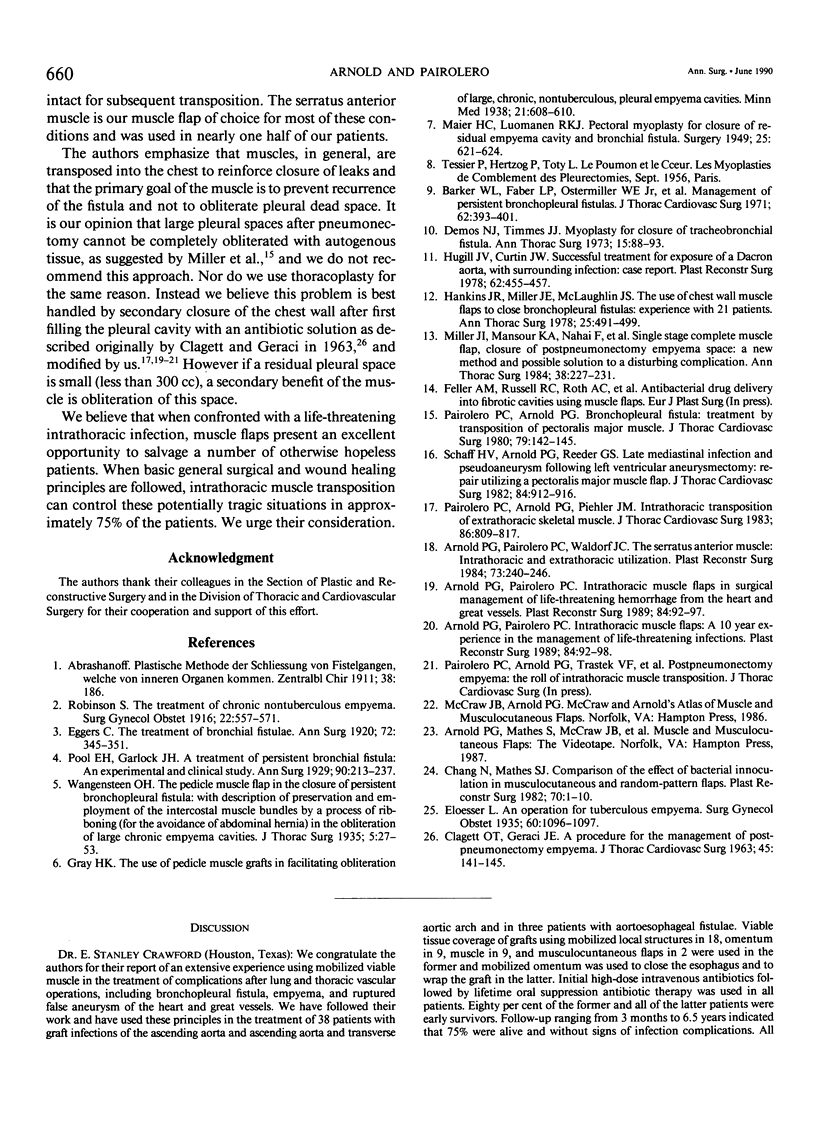
Selected References
These references are in PubMed. This may not be the complete list of references from this article.
- Arnold P. G., Pairolero P. C. Intrathoracic muscle flaps: a 10-year experience in the management of life-threatening infections. Plast Reconstr Surg. 1989 Jul;84(1):92–99. [PubMed] [Google Scholar]
- Arnold P. G., Pairolero P. C. Intrathoracic muscle flaps: a 10-year experience in the management of life-threatening infections. Plast Reconstr Surg. 1989 Jul;84(1):92–99. [PubMed] [Google Scholar]
- Arnold P. G., Pairolero P. C., Waldorf J. C. The serratus anterior muscle: intrathoracic and extrathoracic utilization. Plast Reconstr Surg. 1984 Feb;73(2):240–248. doi: 10.1097/00006534-198402000-00015. [DOI] [PubMed] [Google Scholar]
- Barker W. L., Faber L. P., Ostermiller W. E., Jr, Langston H. T. Management of persistent bronchopleural fistulas. J Thorac Cardiovasc Surg. 1971 Sep;62(3):393–401. [PubMed] [Google Scholar]
- CLAGETT O. T., GERACI J. E. A procedure for the management of postpneumonectomy empyema. J Thorac Cardiovasc Surg. 1963 Feb;45:141–145. [PubMed] [Google Scholar]
- Chang N., Mathes S. J. Comparison of the effect of bacterial inoculation in musculocutaneous and random-pattern flaps. Plast Reconstr Surg. 1982 Jul;70(1):1–10. doi: 10.1097/00006534-198207000-00001. [DOI] [PubMed] [Google Scholar]
- Demos N. J., Timmes J. J. Myoplasty for closure of tracheobronchial fistula. Ann Thorac Surg. 1973 Jan;15(1):88–93. doi: 10.1016/s0003-4975(10)64939-9. [DOI] [PubMed] [Google Scholar]
- Eggers C. THE TREATMENT OF BRONCHIAL FISTULAE. Ann Surg. 1920 Sep;72(3):345–351. doi: 10.1097/00000658-192009000-00006. [DOI] [PMC free article] [PubMed] [Google Scholar]
- Hankins J. R., Miller J. E., McLaughlin J. S. The use of chest wall muscle flaps to close bronchopleural fistulas: experience with 21 patients. Ann Thorac Surg. 1978 Jun;25(6):491–499. doi: 10.1016/s0003-4975(10)63596-5. [DOI] [PubMed] [Google Scholar]
- Hugill J. V., Curtin J. W. Successful treatment for exposure of a dacron aorta, with surrounding infection: case report. Plast Reconstr Surg. 1978 Sep;62(3):455–457. doi: 10.1097/00006534-197809000-00031. [DOI] [PubMed] [Google Scholar]
- Miller J. I., Mansour K. A., Nahai F., Jurkiewicz M. J., Hatcher C. R., Jr Single-stage complete muscle flap closure of the postpneumonectomy empyema space: a new method and possible solution to a disturbing complication. Ann Thorac Surg. 1984 Sep;38(3):227–231. doi: 10.1016/s0003-4975(10)62243-6. [DOI] [PubMed] [Google Scholar]
- Pairolero P. C., Arnold P. G. Bronchopleural fistula: treatment by transposition of pectoralis major muscle. J Thorac Cardiovasc Surg. 1980 Jan;79(1):142–145. [PubMed] [Google Scholar]
- Pairolero P. C., Arnold P. G., Piehler J. M. Intrathoracic transposition of extrathoracic skeletal muscle. J Thorac Cardiovasc Surg. 1983 Dec;86(6):809–817. [PubMed] [Google Scholar]
- Pool E. H., Garlock J. H. A TREATMENT OF PERSISTENT BRONCHIAL FISTULA: AN EXPERIMENTAL AND CLINICAL STUDY. Ann Surg. 1929 Aug;90(2):213–237. doi: 10.1097/00000658-192908000-00005. [DOI] [PMC free article] [PubMed] [Google Scholar]
- Schaff H. V., Arnold P. G., Reeder G. S. Late mediastinal infection and pseudoaneurysm following left ventricular aneurysmectomy: repair utilizing a pectoralis major muscle flap. J Thorac Cardiovasc Surg. 1982 Dec;84(6):912–916. [PubMed] [Google Scholar]


